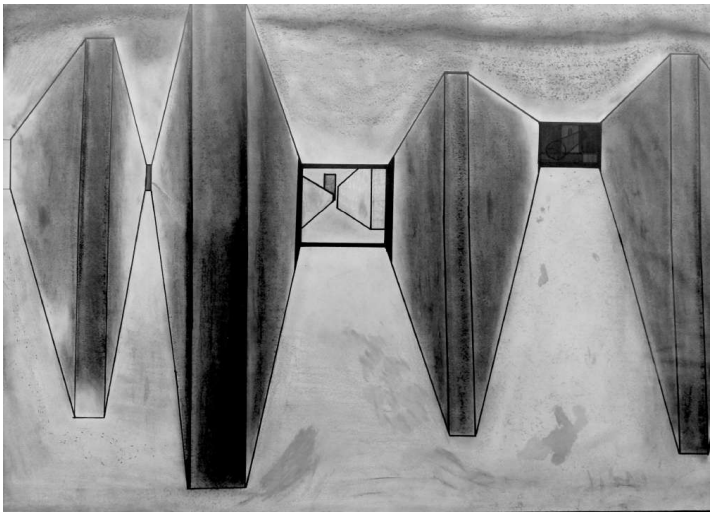I’m not sick, it is just sick how good I am at loving life
Text & paintings by Oliver Tonning, stud.psych.
Today I was looking at my old papers from the Danish department of child psychiatry. I was only ten years old then they labeled me with ADHD, autism and dyslexia.
The language in the papers is harsh; it doesn't reflect the curious and smiling child who initially just wanted help to live his life the best way possible. The words became a cloak of illness, which may have served the hospital's bureaucratic allocation of resources, but at the same time, it conjured up demons where understanding was needed. Illness is only a fraction of being different. When I soon graduate as a psychologist, I bear responsibility for entire holistic lives, not just diagnostic extracts. Autism and ADHD are forms of neurodivergence that can unlock wonders in an individual's life if understood correctly. But this story remains untold as long as it is absent from the established systems.
Let me tell you a part of my story.
One of my earliest memories is from a summer day. I stand at the top of a staircase in the school building that housed the young children. I was warm in the cheeks. The plate in my hands was white, and the walls around me were a child-friendly yellow. I looked down over the railing of the stairs, sniffled, and threw the plate at one of my friend's moms. I can remember that she was sweating too, and I thought it was because of the heat in the stuffy building. When my teacher finally got hold of me, the stream of memories disappears. Maybe the teacher exhibited the best pedagogical practices, and maybe other things happened. I don't know. What I do know is that such a meltdown was not uncommon for me, or other children like me. Being overwhelmed by the world was a recurring theme. The world was too loud, too bright, too smelly, and too close to a body that was always ready to defend itself against its assaults.
For a long time, I thought I was the only one perceiving the world in thick and jarring bursts. It was difficult for me to distinguish between what was happening outside and what was happening inside. The neurodivergence didn't allow my brain to draw sharp boundaries between anything. I was always lost in a space between places.
Emotions are the body's language. A mentor and a guide that tell us where to go when confronted with the many paths in the through the world. Emotions are the inner shepherd, telling us which paths are dangerous and which ones we can trust. When everything both inside and outside is in a state of chaos, emotions become a foreign language, a noise without substance. When emotions can’t guide us anymore, it becomes meaningless to listen, because there is nothing of value in its speech. At some point after I stopped listening, the body became completely silent. Everything became quiet and Everything was noise. My emotions had quit their job and life became a shadow of itself. Sadly, this is the true inner state for many misunderstood neurodivergent children.
Elskende i skov (Lovers in woods)
Many years later I was at a Christmas party at the Copenhagen Institute of Psychology in a small, crowded cafeteria. Next to me sat a researcher, and just a few days earlier, me and my girlfriend was not able to hide all the ways we were in pain anymore. Neither of us could clearly define what was oneself and what was the other. I had left her in the Royal Gardens, after once again being unable to distinguish whose feelings belonged to whom. The researcher was studying autism, and we were a bit tipsy. I thought her focus on autism was way to disease oriented. My thoughts jumped to the Royal Garden, where I looked over my shoulder and saw my girlfriend slowly becoming a smaller and smaller trembling dot, surrounded by the engulfing greenery. We had been lying in bed a few days before, watching the series 'Love on The Spectrum' together. We felt recognized, seen by the TV, and giggled under the covers.
The researcher shouted and reached me through the noisy cafeteria. She said that autistics are characterized by an experience of merging with the outside world. Their exaggerated integration of sensory stimuli can make it difficult for them to maintain a mental separation between themselves and others. There is a collapse of the subject-object distinction. Distances dissolve and are consumed in a flickering whole. When you have such a neurological divergence, the world can feel too real, too distant, and entirely impossible. Once again, I saw my girlfriend, now less than a grain of sand on the horizon, and for the shortest moment I knew I had taken our time under the covers for granted.
Excitedly, I asked the researcher if the autistic hypersensitivity only applied to pain. The researcher looked at me with confusion, and I added whether the excessive sensory integration only leads to negative emotions. She nodded in an awkward attempt to follow my train of thought. I continued and I asked if the entanglement with the world could be scientifically examined from a non-pathological perspective. If the entanglement with the world can result in severe anxiety and depression, then what about love and joy? The researcher looked puzzled, and I was about to say something about poetry but when the institute director tapped at a glass to give a speech.
Stue med vindue (Room with a window)
Shortly after, I wrote a letter to my now ex-girlfriend. I asked her if we weren't lucky. We were able to experience love in a way that that few other could. I asked if the inability to distinguish you and me and the world wasn't precisely what all the poets had written about since the dawn of time. Whether beauty and love aren't the inability to create differences. The loss of what is you and what is me, so that the only thing left is a dizzying whole. When we experienced the dissolution of the ego and the union of minds and bodies, we were in the midst of living the final verses in all the old poems about the nature of love. The abandonment of the self to instead be in a warmly and wired you and I. That is what everybody must seeks in love. Isn’t it true, that our neurodivergence give us the possibility to disappear into a felt eternity in the gaze of the other? I mean a deep sense of connection, understanding and intimacy that transcends ordinary experiences; the neurotypical way of receiving the world.
I think all of this is possible of we just reclaim our bodies. If we once again get to know our emotions, we can unlock the gift of our sensitivity. If we let them speak to us, not just in the loud voices of angst, but in the soft whisper of love, we can get the guidance of our sensitive self’s back. The loudness within us is not only a path to pathology but also a road to the beauty of life.
Our relationship had been characterized by an insatiable curiosity, an unquenchable hunger for the world and each other.
From a perspective evolutionary psychology, this is the survival advantage of ADHD. It pulls its person out into the world, beyond the plains and into unfamiliar territory. It drives the individual to seek food, to look for the unknown. It's the unstoppable search for resources during times of scarcity. But what her and me were searching for was the unknown sense of togetherness. A clouded need to be spoken to by the same neurodivergent emotional language that our own body speaks. To be listened to by a body that knows the secrets in our words.
Isn't this an obvious subject for phenomenological studies? Shouldn't this be a branch within the neurodivergent research?
Collectively, these divergences lead to an experience that many neurotypicals may envy. Intense experiences seem to be intertwined with the pinnacle of self-realization in modern society. In the modern world, we are obsessed with the joy of pure experience. Experience economy is one of the fastest-growing markets. But perhaps more importantly, these experiences should not just be experienced; they should be felt. They should not just be passively captured in the dark chambers of our phones. The value of experiences lies in the emotions they evoke. It's the immersion in the experience that counts. The emotional merging with what is experienced seems to be what everybody seeks and values as the meaning of life. Neurodivergent people cannot stop feeling life as a never-ending presence. Our lives are always engaged in a deeply felt experience. An emotional depth that neurotypicals hunger for.
Perhaps it's a superpower that has hit us without us realizing it. I'm not talking about the kind of instrumentalized superpower you see in movies. It's not about autistic individuals solving complex tasks for large corporations. It's also not about people with ADHD excelling in Silicon Valley because they are risk-takers, quick thinkers, and have minds filled with bouncing ideas. Instead, I'm talking about the ability to be the most human of humans. I'm talking about a superpower that hands me a life with a never-ending sense of existence.
I think this is where the story about us should begin.
We are the most alive. When I as psychology sits in front of neurodivergent children, I will tell them that their uniqueness is a gift. It's possible that neurodivergent individuals may lose out in the modern consumerism and fast-paced society, but they gain an invaluable sense of what humanity is all about. They gain the ability to always be present and engaged in the intricacies of life itself.
Rum i rum (Space in space)



